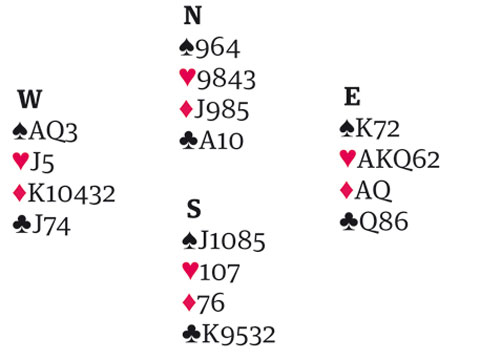An unspectacular discard wins the hand
Just as the most spectacular and satisfying move a player can make at chess is the sacrifice of a queen, at bridge the discard of an ace is much admired by spectators. But the unspectacular discards can be just as important, as shown on today’s deal from the TGRs Super League. Two of England’s silver-medal-winning team were in opposition on the deal and more than a thousand spectators were watching via BBO. East-West vulnerable, dealer East:
At one table East-West bid 2NT-4NT-Pass against which South led the fourth highest card of his longest suit and the defenders cashed two club tricks.
At the other table West raised to six no trumps, against which South, Norway’s Thor-Erik Hoftaniska, was never going to lead a club away from the king. His actual choice was a spade and declarer, David Gold, settled down to cash his winners.
It seemed that since the diamonds did not break, declarer had no more than eleven tricks. But on the run of the major suits the North hand would come under pressure – if declarer played off the ace and queen of diamonds, then five hearts, then two more spades, everyone would be reduced to three cards.
North would have to keep two diamonds to prevent dummy’s ten from becoming a trick, so would be able to hold on to only one of his clubs. If that club were the ace, declarer could throw him in with it to compel a lead into the king-ten of diamonds in the dummy. Of course, this would require declarer to read the cards very well and not simply play for the diamonds to break, but no one doubted that Gold was up to the task – least of all Artur Malinowski in the North seat. He discarded the ace of clubs on the last spade, and when declarer exited from dummy with a club, South was able to claim two tricks with the king of clubs and the long spade. Of course, he had to have kept that seemingly useless spade, but there’s no point throwing away an ace if your partner hasn’t also been playing his part.



 The Guardian
The Guardian